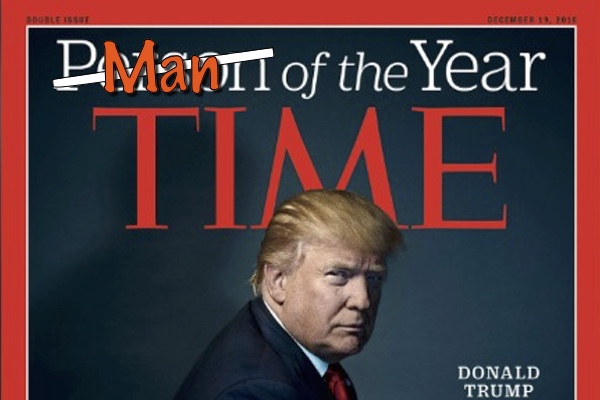Donald Trump’s Complaining that He Was Named “Person” of the Year.

This past week President-Elect Donald J. Trump took several occasions to criticize being named Time magazine’s “Person of the Year.” Instead, Trump insists, this honor needs to return its former title: “Man of the Year.” On Friday he asked the preference of a crowd at a Louisiana rally for Republican Senate candidate John Kennedy, taking their cheers to mean assent to his suggestion that the honor be renamed. This came after the minister introducing him had reassured the crowd that Trump’s White House will be one “where men know who men are” and “women know who women are.”
Critics have noticed with dismay that Trump’s desire to “Make America Great Again” is a seeming wish to restore it to the 1950s—presumably to an America where African Americans, and women, and immigrants, and most of the other groups Trump has targeted knew their place. But this “men will be men” and “women will be women” rhetoric dates much further back in American history, and is a reminder both of the dangerous backslide of our present moment and of how, in American history, the privileged have upheld a government rooted in white male supremacy by denying rights to many groups and seeing these denials as all bound up together.
In 1776, Abigail Adams famously implored her husband to “Remember the Ladies” in the new American political system that he was engaged in creating. (It is this letter which seems to have inspired the Hamilton song in which Eliza Schuyler proclaims, “When I meet Thomas Jefferson I will compel him to include women in the sequel.”) Less famous than Abigail’s request is John Adams’s reply, in which he chided his wife that although he had “been told that our Struggle has loosened the bands of Government everywhere,” he had no idea that women, in addition to apprentices, Indians, and “Negroes,” were “another Tribe” that had become “turbulent,” presumably because of rumblings of all groups to claim liberty. Though he dismissed all of these constitutencies, John Adams recognized that exclusions from the polity were interlinked - that lack of acknowledgment of full humanity and possibilities for all lay at its core.
Opponents to antebellum abolition, northern as well as southern, recognized the same fundamental linkage. In an 1845 rant against the antislavery movement for attempting to turn the world upside down, Cincinnati minister Nathan Rice proclaimed of his antislavery opponent: “I maintain, that he has no right to urge against the relation of master and slave, an argument which, if sound, will sweep away every other relation.” And in the immediate aftermath of the war, anti-abolitionist speaker John Van Evrie reminded Americans of the importance of policing boundaries: in an 1868 treatise advocating continued white supremacy, he boldly theorized, “The American or the Southerner knows that the Negro is a Negro, and is not a Caucasian, just as clearly, absolutely, and unmistakably as he knows that black is black and is not white, that a man is a man and is not a woman.”
The 1876 Centennial, too, would find Susan B. Anthony and a small core of women’s rights protestors also proclaiming women’s fundamental humanity – that, in the words of former Democratic candidate Hillary Rodham Clinton, “women’s rights are human rights.” As the Declaration of Independence was commemorated in a ceremonial reading, Susan B. Anthony charged down the aisle, interrupting the ceremony to scatter copies of her own Declaration, one that proclaimed “our full equality with man in natural rights” and claimed for woman “the absolute right to herself.”
“They used to call it Man of the Year, but now they can’t,” Trump said of Time’s honor. Trump charged that the title was changed out of political correctness (presumably to appease pesky women like me). But in reality, the title changed out of a basic desire to indicate and welcome the full range of humanity. In his insistence that the title change back to preclude women and insist that “Man” be allowed to cover all, Trump implicitly announced—like his anti-abolitionist antebellum forerunners—that any crack in the foundation of white male supremacy was dangerous and might bring the whole house down.
The more modern antecedent, of course, came with the 1970s backlash against second wave feminism, most notably in the person of Phyllis Schlafly. As her Washington Post obituary declared after her death in September, Schlafly “almost single-handedly” stopped passage of the Equal Rights Amendment, the proposed amendment that (simply) stated that equal rights shall not be denied on account of sex. In part Schlafly did this by insisting that the ERA would take away what Trump wants to restore: an America “where men know who men are and women know who women are.”
Advocates for equality and human dignity, from antebellum abolitionists to modern Black Lives Matter movement, have recognized what Trump and others can’t seem to: that adding human rights for ME does not diminish YOUR standing in the world. Rights and humanity are not finite commodities. We do not share the mercantilistic world of our forefathers, who at one point thought the world’s wealth was finite – that one’s wealth could only grow by taking from someone else. We know better. Wealth is infinite. Aren’t rights, too? And, like our abolitionist and feminist foremothers, we recognize that rights and notions of liberty, citizenship, belonging, and humanity are “all bound up together,” as African American activist Frances Ellen Watkins Harper proclaimed in the year after the Civil War. In his own way, Trump is recognizing that, too -- otherwise the tiny chink in male supremacy exposed by being named PERSON of the year wouldn’t matter to him so much.